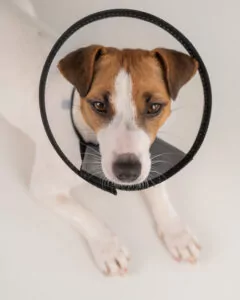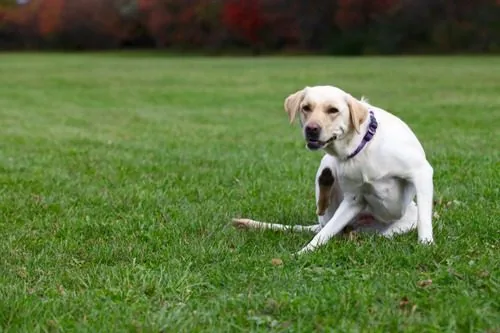Can Dogs Get Cold Sores?
Did you know that canines can get cold sores like human beings? The canine herpes virus, lick granuloma, eosinophilic granuloma, or stomatitis can trigger cold sores.
Dogs and humans can both develop cold sores, but they are more irritating for pups than they are for humans. Cold sores often appear as red bumps on the skin, but they can resemble a blister or look like a pimple. Helping your dog heal from a cold sore may require an Elizabethan collar and rest.
Cold sores are infectious and can be spread from one dog to another. If you want to know more about about dogs and cold sores, peruse this article.

What Are Cold Sores Like For Dogs?
Cold sores are ulcerated lesions that resemble blisters and can be triggered by various causes. The skin can overreact to an allergen or a virus, resulting in redness and inflammation. The lesions may be found in and around the mouth, such as on the lips or the snout.
Pups can get cold sores, just like people. In humans, cold sores can result from the human herpes simplex virus, and in dogs, they can be a symptom of the canine herpes virus. Dogs cannot contract the human form of the herpes virus and vice versa. However, dogs can spread cold sores to other dogs.
Cold sores in humans and dogs generally appear as red bumps on the skin but sometimes they look like a pimple. It can take approximately two weeks to cure in either species. Just like humans, canine herpes can also spread from one dog to another due to respiratory or sexual contact.
What Are The Symptoms of Canine Cold Sores?
It is frequently easy to know when a canine has a cold sore. The ease at which you can spot a cold sore on a pup depends on the color of the coat. However, there are some symptoms you should be aware of if you want to know if it is a cold sore on your pup’s face:
- Persistent licking of the snout and lips
- Discoloration of the lips, tongue, or gums
- Loss of appetite as cold sores can be uncomfortable when chewing
- Pawing at the area to relieve the pain
If your dog has a cold sore, they may also wince or not allow you to touch or pet them along with snout, which is a typical spot for a cold sore on a dog. If you have a puppy with a cold sore, it can be cause for alarm, and it may even be fatal. It is often called “fading puppy syndrome.”
What Can Cause Cold Sores on Dogs?
There are a few causes, with the most widespread being the canine herpes virus. However, there are some other possibilities including lick granulomas and stomatitis. The following include some explanations for these conditions causing cold sores:
1) The Canine Herpes Virus
The canine herpes virus can be propagated through sexual or respiratory contact, like coughing and sneezing. The canine herpes virus is transported via bodily fluids from the nose, mouth, and genitals. Puppies with CHV present with specific medical signs:
- Loss of appetite
- Difficulty breathing
- Thick nasal discharge
- Grayish green, odorless stool
Canine herpes can be spread from one dog to another, even if the first dog has no active infection. A mother dog can pass the virus onto her pups during birth. Adult dogs with canine herpes usually recuperate on their own without intervention.
2) Eosinophilic Granuloma
Cold sores can also be caused by eosinophilic granuloma. Cats experience this affliction more often than dogs, but dogs can have this condition as well. It can occur when a dog has an unfavorable reaction to an insect bite or any condition that can provoke a reaction. Your dog may develop a skin rash or growth that was not there before if they have eosinophilic granuloma.
If your dog has nasal or muzzle swelling or lesions on the head or muzzle, they may have eosinophilic granuloma. Luckily, the ailment can be healed easily with antibiotics and corticosteroids. This condition must be treated promptly to prevent infection, as well as any other health problem from occurring.
3) Lick Granuloma
Sometimes dogs can also develop a wound that looks like a cold sore, which often appears on the wrist. It can occur when the dog becomes fixated on an area of the skin and they lick it incessantly. For example, if a dog becomes anxious or upset due to separation anxiety, they may constantly lick or chew an area on their skin, causing lick granuloma to occur. It can also result from mites, ingrown hair, or infection.
4) Stomatitis
Stomatitis is when the mucous membranes in the mouth and the gums become inflamed. Pups can develop this condition from swellings and lesions or cold sores on the inside of the mouth, making eating a painful experience. Some of the symptoms of stomatitis are:
- Gum inflammation
- Lesions on gums
- Bleeding gums
- Foul breath
Some other symptoms include difficulty eating and grooming and loss of appetite. This illness can also be caused by kidney disease or hypothyroidism. The lesions can be found down to the back of the mouth and throat in more serious instances.
How to Treat a Canine Cold Sore 
If you suspect your canine has a cold sore, you must take them to the vet for a proper diagnosis. Treating a cold sore is often a simple, straightforward process. Cold sores tend to go away with enough sleep and rest. An Elizabethan collar, known as “the cone of shame,” is sometimes required to keep your pup from licking and gnawing at the site.
Relentless licking or gnawing at the sore can cause a serious infection. You should also keep your pup from interacting with other dogs during recovery, as they can infect other dogs. If the cold sore has not cleared up after one to two weeks, get your pup to the vet as soon as possible.
Conclusion
Just like humans, dogs can get cold sores. Cold sores look like a bump or blister on the skin, generally appearing on the dog’s lips or snout. There are different causes of cold sores, with the most common being the canine herpes virus. If you see any unusual bumps on your pup’s skin, get them to the vet as soon as possible, as it could signify a more serious issue.
Are you a pet parent in the Atlanta, GA region? The Village Vets has 7 practices conveniently located across the Atlanta metro area. Find a location near you today!
Recent Posts
About The Village Vets
The Village Vets is a network of animal hospitals based in Atlanta, GA and the surrounding area. We offer honest, excellent service to our clients in a comfortable, friendly atmosphere. To learn more about our locations and how we can better serve you and your pet, click the button below.
Share This Post
Recent Posts
About The Village Vets
The Village Vets is a network of animal hospitals based in Atlanta, GA and the surrounding area. We offer honest, excellent service to our clients in a comfortable, friendly atmosphere. To learn more about our locations and how we can better serve you and your pet, click the button below.



